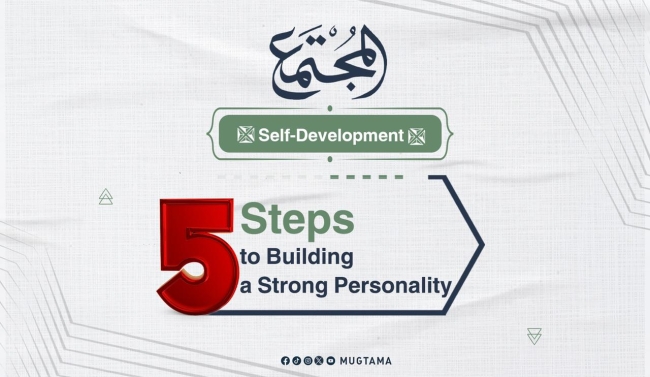One is not born with a weak personality; rather, the environment they grow up in plays a role in shaping their personality, whether positively or negatively. To avoid the negative impact on oneself, one must adopt a comprehensive outlook on life, which includes paying attention to intellectual and spiritual aspects, in addition to practical ones. Balancing these aspects helps overcome challenges and build a strong personality.
In this article, we will cover five steps to build a strong personality:
1. Self-Acceptance
Self-acceptance means that a person accepts the physical and psychological traits that Allah has granted them, both good and bad. Allah says: “We have certainly created man in the best of stature” (Surah At-Tin: 4). This lies in acknowledging flaws without diminishing one’s value, such as accepting being overweight without making it the center of our identity. This enables us to change what can be changed and live with what cannot be changed.
2. Setting Personal and Ethical Goals
Once we reach self-acceptance, we should set goals that align with our principles and ethics and drive them toward personal and spiritual growth. Such as developing patience, generosity, and self-control. We Muslims have great role models in the life of the Prophet ﷺ, his companions, and the followers after them. Allah says: “There has certainly been for you in the Messenger of Allah an excellent pattern” (Surah Al-Ahzab: 21). Following these examples guides us to the path of success in this life and the Hereafter.
3. Developing Positives
A person’s traits are dynamic, not static, meaning they can be developed and utilized, this is what Islam's teachings clarify. For instance, kindness does not mean responding kindly in every circumstance; that would be rigidity. Good sense and skills developing improve your character and personality without being exploited by others. For Stagnant kindness leads to pleasing others at the expense of oneself, whereas Islam commands moderation. Allah says: “And thus We have made you a just community” (Surah Al-Baqarah: 143).
4. Developing Emotional Resilience
Life is not just about black and white; it's a spectrum of colors, each representing our emotions and experiences. Emotional resilience allows us to embrace these diverse shades, finding meaning in every phase of life. In moments of hardship, we face sorrow with patience and perseverance, and in times of happiness and success, we respond with praise and gratitude. Above all, we fully surrender to Allah’s decree, trusting in His wisdom, whether in good or bad times. This trust empowers us to face challenges, adapt to changing circumstances, and ultimately emerge stronger, with new successes on the horizon.
5. Continuous Self-Reflection
Self-reflection should be a daily practice to learn from mistakes and avoid repeating them. It's equally important to repent to Allah for our missteps, as the Prophet ﷺ said: “All the sons of Adam are sinners, but the best of sinners are those who repent” (Narrated by At-Tirmidhi). Making mistakes is part of being human, but the true shame lies in pride and refusing to acknowledge our faults. Regular self-reflection and correction are key to monitoring personal growth. So, take time to examine your actions, decisions, and mindset. Ask yourself: Are you living in alignment with your values? Are you making progress toward your goals? This habit ensures continuous personal development and keeps you on track.
Building a strong Muslim personality is an ongoing journey that requires patience and effort. By balancing knowledge, action, reflection, and drawing closer to Allah and adhering to the teachings of His Prophet ﷺ, we can be a good example to ourselves and others, and contribute to building a strong and cohesive community.
-------------------------------------------------------------
The Sources:
(1) Dr. Yasser Al-Huzaimi, Finjan Podcast
(2) "Your Mental Health" series by Ahmed Al-Aawar


